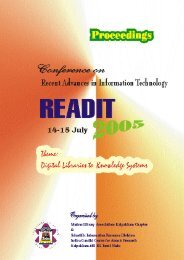READIT-2007 - Indira Gandhi Centre for Atomic Research
READIT-2007 - Indira Gandhi Centre for Atomic Research
READIT-2007 - Indira Gandhi Centre for Atomic Research
Create successful ePaper yourself
Turn your PDF publications into a flip-book with our unique Google optimized e-Paper software.
KM will play an essential role, and those organisations that deploy it early on will have<br />
an edge.<br />
The integration of industrial safety objectives with KM tools could give rise to<br />
Industrial Safety knowledge management systems that use knowledge to improve safety<br />
per<strong>for</strong>mance by lowering the in<strong>for</strong>mation barrier that prevents organizations from<br />
realizing highest safety standards.<br />
2. KNOWLEDGE MANAGEMENT IN INDUSTRIES: NEED<br />
The objectives of knowledge management in an organization are to promote<br />
knowledge growth, knowledge communication and knowledge preservation in the<br />
organization (Steels, 1993). It entails managing knowledge resources in order to facilitate<br />
access and reuse of knowledge (O'Leary, 1998a).<br />
Knowledge Management is highly essential in industries because<br />
• Too much in<strong>for</strong>mation impedes decision-making.<br />
• For managers, relevant in<strong>for</strong>mation is more important than "in<strong>for</strong>mation<br />
anywhere".<br />
• Knowledge based working environment is as important as IT <strong>for</strong> effective<br />
knowledge management.<br />
• Effective knowledge management pays.<br />
• Knowledge management is a vital tool <strong>for</strong> competitive advantage.<br />
Knowledge Management delivers benefits like:<br />
• Increased productivity by managing in<strong>for</strong>mation assets better<br />
• Improved access to in<strong>for</strong>mation<br />
• Make organisation more knowledge oriented<br />
Knowledge Management in an industry allows its employees to learn about new<br />
technologies, have discussions, get technical queries answered and even draft project<br />
proposals. This may result in a reduction in training time and a boost in productivity due<br />
to better sharing of knowledge among its employees.<br />
Knowledge Management addresses the issues effectively like:<br />
• Ignorance of what knowledge exists, or of where to find it; and<br />
• Keeping a regularly updated record of who knows<br />
3. KNOWLEDGE MANAGEMENT: ROLE OF LIBRARY<br />
In knowledge based economy, libraries functioning in industrial establishments<br />
always referred to as Knowledge <strong>Centre</strong>s. The prime objective of libraries is to serve the<br />
users with ample in<strong>for</strong>mation using tools, techniques and methods of Knowledge<br />
Management. Libraries play a major role in the production, diffusion and utility of<br />
48

















